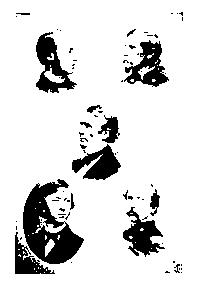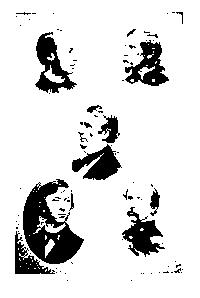
Senator William Pitt Fessenden and his four sons, all Bowdoin graduates. Image: George J. Mitchell Dept. of Special Collections & Archives.
Bowdoin is preparing to commemorate the sesquicentennial of the American Civil War with Alumni College programming. “The Afterlife of the American Civil War,” a series scheduled August 8-11, 2013, will feature keynote speakers, talks by Bowdoin faculty and walking tours of historic Brunswick.
In the months leading up to the Alumni College, the Bowdoin Daily Sun, at the beginning of the month, will post Civil War milestones and other remembrances related to the College.
With thanks to the George J. Mitchell Department of Special Collections & Archives, this month we feature a transcription of a letter, dated December 20, 1862, from Senator William Pitt Fessenden (Bowdoin Class of 1823) to his father. Fessenden served Maine in the U.S. Senate (1854-1864, 1865-1869) and was Secretary of the Treasury under President Lincoln from July 1864 to March 1865.
W.P. Fessenden
Dec. 20, 1862 Washington
My Dear Father
I am delighted to know that you are in very good health. I shall hope to find you still more improved when I return in the spring. I had not got fairly rid of my cold when I left home, and its effects continued to trouble me for some days after I arrived. I am now, however, quite well again, and in a condition for the hard work before me. James and his wife are here, and well. Frank had a bilious attack a few days since, and like a sensible fellow, came in to me, and remained until cured. His camp is just over the river. He is much respected and beloved, and I have the pleasure of seeing him often.
Our repulse on the Rappahannock has undoubtedly distressed you as it did us. It was a foolish affair, altogether. The loss is not, however, nearly so great as represented by the newspapers. The killed is not much over one thousand. The wounded is large, but the great majority of wounds are very negligible. I do not see much chance of further active operations here during the winter – but they will be carried on vigorously on the southern coast and the gulf. I hope for good results. The army is in good condition, and it is to be hoped that we are learning something by experience.
You will see a great deal in the papers about resignations in the Cabinet, and many speculations as to who are to fill the vacant places. Mr. Seward has undoubtedly resigned. Others, perhaps, have done, or may do, the same. Mr. Seward’s action was occasioned by the course taken by the Republican members of the senate, which he had reason to think was aimed at him. My own opinion is, however, that it will result in no changes, tho’ the [fight] may, and I think will be productive of good. The President thinks he cannot get along without Seward, and really, it would be very difficult to supply his place, at this juncture. For though I have little confidence in him, still he represents a great and powerful array of friends, and our foreign affairs are too complicated for a fresh hand. Our great trouble, after all, is not so much in the Cabinet as in the President. He is an earnest and true man, but lacks dignity, order, and vigor-three terrible defects in times like these. We suffer, too, in having our military operations directed by men who are not fighting for an idea-indeed, have no feeling in common with the true cause. We are doing everything possible to remedy this last and have good hopes of partial success. Gen’l Burnside is, I think, a true man, and a good officer, but his [first] [movement] has been a blunder.
I hope mother is well. Give my love to her, & believe me Ever, your affectionate Son,
W. P. Fessenden

Senator William Pitt Fessenden and his four sons, all Bowdoin graduates. Image: George J. Mitchell Dept. of Special Collections & Archives.

